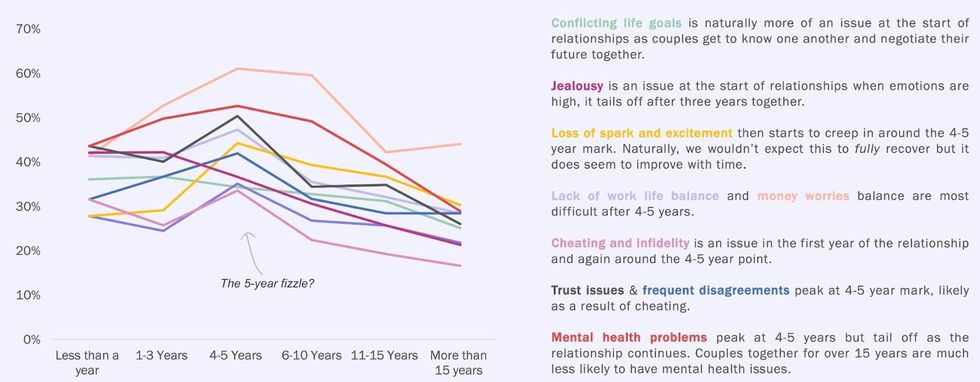Sinead Butler
Aug 05, 2023
Does 'micro-cheating' go too far in relationships?
content.jwplatform.com
There are always highs and lows when it comes to any relationship, but recently a new term has been coined about a particular time when a relationship goes through hardship.
Paired - the no. 1 relationship care app - has found that relationships experience the most turbulence and angst during year five and coined the term "five-year fizzle."
To help couples get over the five-year fizzle in-house experts have taken a deep dive into the most common pain points.
Sign up to our free Indy100 weekly newsletter
A graph which maps out these factors has revealed ‘Trust Issues’, ‘Loss of spark’ and ‘Money worries’ to all reach their peak in years four and five.
Here is the graph and the different factors explained:

Paired’s In-House Relationship Expert Moraya Seeger DeGeare, MA, LMFT (she/her) has shared her expertise on how couples can navigate their five-year fizzle and strengthen their relationship from this experience:
Is it normal for couples to experience the five-year fizzle?
Most of us have heard of the seven-year itch but recent research from Paired revealed relationships are now experiencing the most turbulence and angst during year five.
While couples tend to divorce at year seven, that’s not when things start to feel disconnected - so it’s important to talk about year five.
What are the pain points?
We call this the “five-year fizzle” and it is often driven by common relationship pain points, like a breakdown in trust and communication. Our research uncovered which pain points are driving this divide in relationships, including:
- Money worries
- Mental health
- Trust issues
- Lack of work-life balance
- A loss of spark and excitement
- Parenting in the Pandemic
- Unsatisfying sex
If couples can address earlier moments when intimacy feels blocked, they have a better chance of turning the relationship in a positive direction.
The five-year fizzle is about dancing more in sync. The seven-year itch is more like trying a bunch of creams for your hives.
Recommendations
As a couples therapist, I recommend that couples try therapy not only during a crisis but also for relationship care before someone has caused significant hurt and when recovering from betrayal.
It's normal to experience chapters where you feel less connected to your partner, such as during a period of sleepless nights with a young child or while navigating a big life event, or when dealing with personal mental health challenges.
However, what distinguishes the couples that successfully move on to the next positive chapter from those who don't is their willingness to work on their relationship, to openly discuss what's going on inside with their partner, and to lean into their partner rather than retreat.
All relationships require work - and that’s okay - and these issues can typically be resolved by working on communication and connection in an easy-to-manage way.
Paired has created specific question packs, games, and check-ins which focus on these key areas for couples to open up about these pain points.
While 98 per cent of couples who used the Paired app for 3 months agreed they openly communicated with their partner, with 81 per cent of those crediting the app for improving their communication as a couple.
What are the main signs that a couple is going through the five-year fizzle?
It’s important to remember every relationship is different, but some of the common early signs are:
- You feel blocked from deeper moments of connection
- You're easily irritated by your partner
- You feel emotionally disconnected
- You don't prioritise spending time together
- You can’t figure out why communication feels hard most of the time
- You feel constantly misunderstood by your partner
- You're not interested in resolving conflicts
- You have little to no emotional connection
- You stop doing new, fun things together
- Your partner is not the first person you want to share exciting news with.
How can long-term relationships get their ‘spark’ back?
It is completely normal for couples in long-term relationships to go for periods without physical intimacy, and what a “long time” means depends deeply on the couple.
Over 40 per cent of Paired users shared that loss of spark and excitement peaks at the 4-5 year mark.
When individuals are not genuinely invested in understanding their partner on a deeper level, it can result in a shallow or superficial relationship, characterised by a lack of intimacy, empathy, and communication.
There’s no fixed timeline for getting things back on track, but there’s always hope as long as you’re both open about what might have caused you to drift apart, work on addressing this and rebuild trust and affection.
Don’t get disheartened if there are any setbacks or if change doesn’t happen right away - it’s natural for these things to take time. And remember to keep stock of what is working well.
These are my top tips for rekindling the connection.
- Be curious about each other - Often we feel like we know our partners so well but people are constantly evolving. Asking your partner questions about what they’re excited about and what they’re looking forward to fosters curiosity and helps us stop longing for something in the past. If you feel stuck on what to ask, the Paired app has thousands of themed conversation starters and question packs to get you started.
- Find time for things you both enjoy - It can be a good idea to create a bucket list of activities you would like to do together at the end of each month. Doing something new together can create a sense of fun and connection.
- Bring a schedule into the bedroom - When it comes to relationships, it’s completely normal for sex to take a backseat at times. If it’s time that’s stopping you, try setting up a schedule or booking a ‘sex appointment’ with your partner. It might not sound sexy, but I often find it’s just the thing couples need.
- Be attentive to each other - This doesn't mean making a special effort to go out to dinner every night, it simply means talking and really listening to each other. Be sure to put the phones down, turn off the TV and tune out distractions to make time to really connect.
Why is communicating through conflict important?
Conflict is a natural part of any relationship. It's how we handle conflict that determines whether it will be destructive or constructive.
When couples communicate effectively through conflict, they are able to:
- Resolve their differences. When couples can communicate effectively about their problems, they are more likely to be able to resolve them in a way that is mutually satisfying.
- Build trust. Working through conflict as a couple builds trust. They are showing each other they are willing to listen to their partner’s concerns and work together to find solutions.
- Grow closer. Navigating through conflict actually helps couples grow closer. They are learning more about each other, getting curious about what their partner is experiencing and working together to improve communication and connection.
Research has shown couples who used the Paired app were three times more likely to resolve arguments, according to independent researchers at The Open University and the University of Brighton.
How to support each other's work-life balance and long-term life goals
The most common challenge is a lack of quality time together. 45 per cent of Paired users find a lack of work / life balance their pain point so as a relationship therapist, I would recommend the following:
- Be open and honest about your needs and expectations. Talk to your partner about the time, support, and understanding you’d benefit from. Be clear about your long-term goals and how you want to achieve them.
- Be flexible and accommodating. Things don't always go according to plan, so be willing to be flexible with each other's schedules and expectations. If one of you has a busy day at work, can the other pick up the slack at home?
- Communicate regularly. Talk to each other about your day, your work, and your goals. This will help you stay connected and on the same page.
- Be supportive and encouraging. Be there for your partner when they are going through a tough time. Offer your support and encouragement, and help them stay motivated towards their goals.
- Take breaks together. Make time for each other, even when you are both busy. Go on dates, take walks together, or simply spend some time talking and laughing.
- Celebrate each other's successes. When your partner achieves a goal, be sure to celebrate their success. This will show them that you are proud of them and that you are there for them.
How to approach tough conversations regarding intimacy, money and trust
How we manage money in relationships is perhaps one of the most telling signs of who we are. It points to how we were raised and how we’ve learned to share power and trust with those closest to us.
Aligning with your partner on spending habits and budgeting can be difficult, so it is no surprise that half of the couples who took part in an Instagram poll from Paired said financial difficulties cause conflict in their relationship and 60 per cent wish they had more support when it comes to financially preparing for the future.
- Choose a safe and private place to have the conversation. This will help both people feel more comfortable and relaxed.
- Start by asking your partner how they're feeling about the issue. It’s beneficial to get a sense of their perspective and where they're coming from.
- Be prepared to answer your partner's questions. They may have questions about your feelings, your expectations, or what you want to change.
- Be willing to apologise if you've done something wrong. This will show your partner that you're committed to the relationship and that you're willing to make things right.
- End the conversation on a positive note. This doesn't mean that you have to agree on everything, but it does mean being able to leave the conversation feeling hopeful about the future of your relationship.
Have your say in our news democracy. Click the upvote icon at the top of the page to help raise this article through the indy100 rankings.
Top 100
The Conversation (0)














